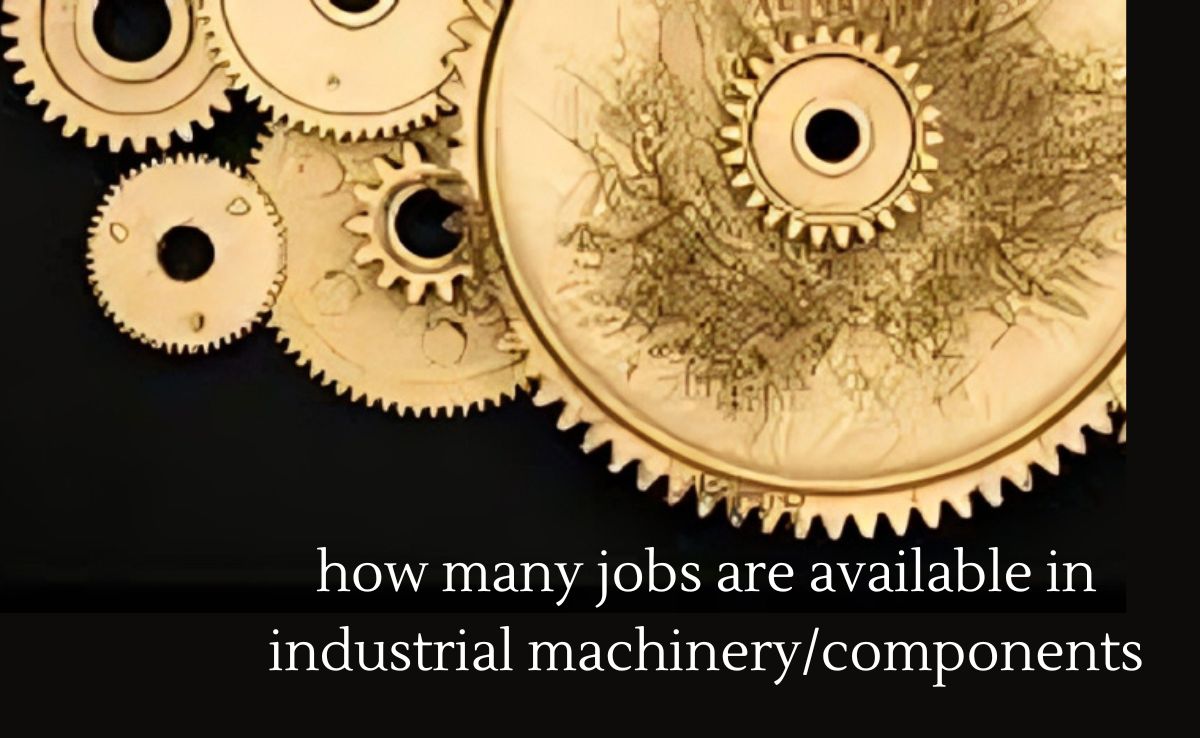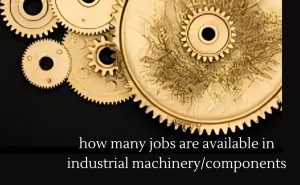In the production industry, industrial machinery and parts are important. These parts are essential to all industrial operations in the current day, from large equipment that processes raw materials to complex systems that manage manufacturing lines. However. How Many Jobs Are Available In Industrial Machinery/Components?
Industrial machinery design, construction, installation, and operation require qualified personnel due to the constant improvements in technology. This article will examine the many roles that are available in How Many Jobs Are Available In Industrial Machinery/Components labor market.
Table of Contents
ToggleIndustrial machinery: what is it?
Tools and equipment used in a variety of industrial sectors are referred to as industrial machinery. It covers building, material handling, processing, and metallurgy. These devices are necessary for large-scale production capacities in contemporary manufacturing processes.
Lathes, drills, and milling machines are instances of metalworking equipment that convert metal into various shapes. Conveyor systems and hoists are instances of material handling equipment that help moving things from one place to other.
Processing equipment converts raw resources into completed goods, such as plants that prepare food or package goods. During infrastructure projects, heavy machinery such as bulldozers used as construction equipment.
What Is The Employment Area for Industry Machinery/Components?
Since 2021, there were 121 thousand vacancies in industrial machines and components, up from 102 thousand during 2011. Nevertheless, the number of vacancies in the companies is expected to decline to 115,000 during 2031.
Professionals with knowledge might find plenty of choices in the industrial machinery and components area due to its large vacancies market. Industrial automation, mechanical engineers, electrical engineering, and related professions are in big demand since there is a growing requirement for affordable, effective, and sustainable manufacturing processes.
Positions like design engineer, project manager, or assembly line technician are examples of careers in this industry. The location, degree of experience, and acquired abilities all have a significant impact on pay. However, because of the manufacturing industry’s constant technical breakthroughs, growth prospects are still favorable.
How Many kinds of Jobs Are there In Industrial Machinery/Components?
In this industry, designing engineers, mechanical engineers, machinists, welding, and assemblers are between the most often encountered job opportunities. All industrial machinery will be designed, constructed, installed, and maintained by these persons.
Apart from the conventional industrial positions, there’s a growing need for experts in fields like robotics and automation technologies. As businesses look to improve automation to optimize manufacturing processes, these industries are evolving swiftly.
Let’s examine a few of the most popular positions in the industry.
Superior Examiner: Throughout the manufacturing process, a quality inspector makes sure that the products satisfy the stated criteria. Through routine machine inspections, cleanings, and repairs, industrial maintenance personnel also play a critical role in maintaining equipment operating at peak efficiency.
- Technician for Maintenance: Maintenance technicians employed in a variety of roles and across sectors. Specialized experts, such as industrial mechanical or hydraulic and pneumatic people, are a great asset to most teams as their expert knowledge enhances the general learnings of their colleagues on the maintenance and repair process of machines.
Industrial machinery mechanics skilled specialists with experience in assembling and de assembling machine parts to perform repairs as required.
- Pneumatic and Hydraulic people: Specialists in hydraulics and pneumatics normally skilled in maintaining fluid managing systems connected to industry machinery parts.
- Technical Support: Technical sales representatives are in charge of marketing and selling industrial gear to customers while also offering technical assistance and solutions to suit their demands.
Welders Create or fix parts used in production by utilizing their knowledge of metal fabrication procedures.
- Machinists: From raw materials like metal, plastic, or ceramics, machinists create mechanical parts using precision tools and equipment.
Analysts of Data
This industry has a strong demand for data analysts because their job to gather and analyze data, which then utilized to pinpoint areas where maintenance procedures and machinery performance could improved. Their knowledge aids businesses in making defensible choices about operations, resource allocation, cost-cutting plans, and quality control procedures.
Engineers in Mechanical Systems
When design industry systems, mechanical engineers play an important role in making sure they both meet technical needs and safety rules. A deep understanding of fluid things, thermodynamics, mechanical, and different technical disciplines is important for this line of work. Working with specialists who may have specialized in different fields, such as software developers or electricians, they handle everything from small machine parts to complete assemblies.
Managers of Purchasing
In the manufacturing industry, purchasing managers are responsible for effectively locating raw materials for a company’s production lines, such as gears, metal castings, or electronic components. Additionally, in order to help cut costs at scale, they are in charge of contract negotiations with suppliers as well as the streamlining of procurement procedures that include the drafting of purchase orders, shipping monitoring, and supplier management.
Engineers in Industry
Industrial engineers concentrate on optimizing manufacturing techniques and material handling procedures, monitoring employees’ interactions with factory equipment.
Reducing waste, implementing the best processes at scale wherever there may be bottlenecks causing inefficiencies across batches of products, and auditing multiple departments in order to streamline workflow efficiencies.
Engineers for Continuous Improvement
Continuous Improvement Engineers apply Six Sigma or Lean principles, which widely used across industries like chemical, nuclear, aerospace, and automotive food processing and cosmetics, to drive rigorous product design, evaluate system effectiveness through metrics and implementation failure analysis, and assess external customer feedback.
In summary
How Many Jobs Are Available In Industrial Machinery/Components and components sector offers a wide range of work opportunities to suit different interests and skill levels. There are several job kinds available, ranging from leadership roles to entry-level jobs without experience, so there are plenty of opportunities for growth and promotion based on skill sets and qualifications. We addressed the number of employment available for industrial machinery and components in this post.
Technology is expected to develop new job types as it does so at a rate that has never seen before in all industries worldwide. i.e., over time, even more alternatives might become available!







